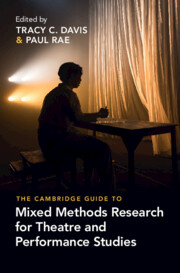Book contents
- The Cambridge Guide to Mixed Methods Research for Theatre and Performance Studies
- Reviews
- The Cambridge Guide to Mixed Methods Research for Theatre and Performance Studies
- Copyright page
- Contents
- Figures
- Tables
- Contributors
- Acknowledgements
- Introduction:
- Part I Planning
- Chapter 1 Methods Dialogue:
- Chapter 2 Planning a Research Project:
- Chapter 3 Interdisciplinary Acts:
- Chapter 4 Mixing Methods in a Multi-Sited, Collaborative Project:
- Chapter 5 Methods Dialogue:
- Part II Doing
- Part III Interpreting
- Index
- References
Chapter 5 - Methods Dialogue:
Ethics
from Part I - Planning
Published online by Cambridge University Press: 01 February 2024
- The Cambridge Guide to Mixed Methods Research for Theatre and Performance Studies
- Reviews
- The Cambridge Guide to Mixed Methods Research for Theatre and Performance Studies
- Copyright page
- Contents
- Figures
- Tables
- Contributors
- Acknowledgements
- Introduction:
- Part I Planning
- Chapter 1 Methods Dialogue:
- Chapter 2 Planning a Research Project:
- Chapter 3 Interdisciplinary Acts:
- Chapter 4 Mixing Methods in a Multi-Sited, Collaborative Project:
- Chapter 5 Methods Dialogue:
- Part II Doing
- Part III Interpreting
- Index
- References
Summary
This conversation between Patrick Anderson and Natalie Alvarez focuses on how to do collaborative research, bridge incommensurable differences through understanding, and enjoin researchers’ subjectivity with those with whom they are in conversation. Featured situations for ethical consideration include community–police liaisons and consulting on police training. Considering the tensions between the professional prerogatives of the researcher and the ethics of the participant–observer relationship, one must ask who the research is for, who benefits from it, and how to present, experience, and advocate ethical alignments. Academics’ labour, situatedness, and intersectionality may affect Institutional Review Board (IRB) processes and the stakes of working with communities and academic institutions.
- Type
- Chapter
- Information
- Publisher: Cambridge University PressPrint publication year: 2024



